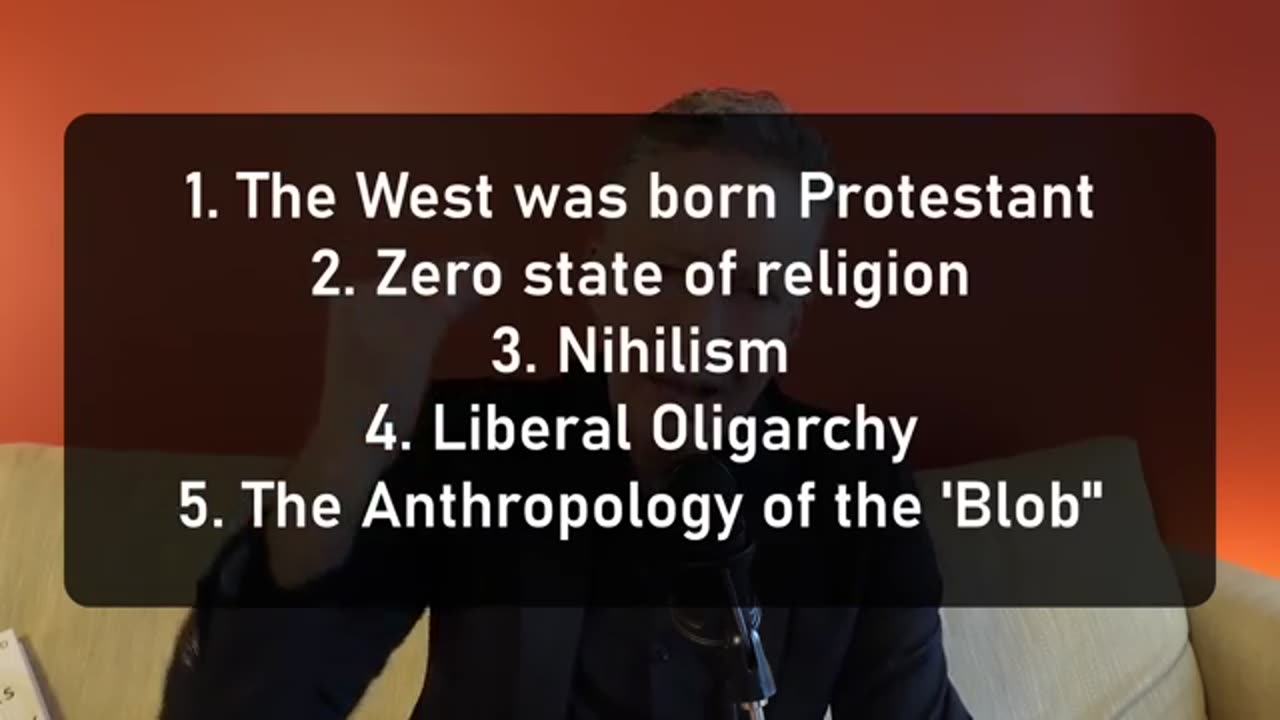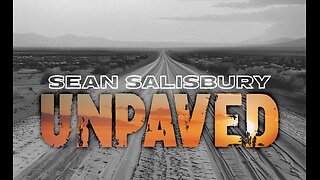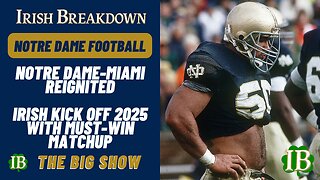Premium Only Content

Emmanuel Todd, Defeat of the West - the main ideas explained in English The Burning Archive
https://www.youtube.com/watch?v=tXZYDtBt9k0
Emanuel Todd's The Defeat of the West is one of the most important books on history and geopolitics in 2024. It was published in January, but it has not yet been translated into English. And it's also not the easiest book to understand because it has some big ideas, which you probably need a little bit of background explanation of to really understand the nature of his argument. So in this video, I'm going to explain to you the key ideas of Emanuel Todd's The Defeat of the West. The main idea is the underpinning ideas about society and the West that you need to understand to really understand the argument. And I'm going to give you a bit of a sneak preview of the narrative of the last 30 years of how NATO, the United States, the West, walked into the trap of Ukraine, as Emanuel Todd says, approached its defeat. And this is so timely because it's July 2024. The NATO summit in Washington is about to occur. And it's incredibly important to understand this book to see some of the, frankly, dangers that NATO presents to the world, why we should really embrace multipolarity and less ardent alliances with powers like the United States of America. So this video is part of a series of videos I'm doing around the NATO summit and around Emanuel Todd's book on The Burning Archive. I'm Geoff Rich. I'm a writer, historian, and I try to help you understand the really good quality world history that's been written out there so that you can make up your own mind about the big events of geopolitics. Emanuel Todd's book. I think the best way to break this book down, here it is, in French, La Défaite de l'Occident. My French is not great, but it's enough to be able to read the book. I think it's best to break this book down into three parts. One is some of the underpinning ideas about history and society that Todd has based on his background as a historian, anthropologist, and demographer, sociologist, if you like, historical sociologist, if you like, the tradition in which he's writing. And then secondly, I'm going to describe to you the five main ideas of the book, which are really around what is the West and how it is approaching defeat. And then finally, I'm going to give you a bit of a sneak preview of the narrative of the last 30 years that ties together those big ideas into events that we can really understand and that help us address how we got into the pickle that we are all in, and that certainly the West and NATO leaders are in their Washington summit as they meet with Emmanuel Macron in crisis, Joe Biden in crisis, a new British prime minister, perhaps, and a lot of difficulties in Ukraine. Let's talk about the underpinning ideas first. Now, I did a video six months or so ago about Emanuel Todd's book that looked at the very start of the book, where he talks about 10 surprises of Ukraine. They include surprises like Russia was much more resilient economically than people expected, or Ukraine was more resilient socially and militarily than perhaps Russia expected. The interesting thing about those 10 surprises, which I'm not going to repeat now, though, is what Emanuel Todd asks, noticing those surprises is, well, why? Why did this happen? Why is it that, if you like, the West launched a war against Russia, that it could not win? What was it about its society that led it to do that? This is where his background as a, if you like, a historical sociologist comes into play. Emanuel Todd himself says that he is a historian in the Annals school tradition, which looks at the long durée, which is long periods of time, long centuries, long developments within societies, and how those developments create a sort of mentality amongst people, how they shape social attitudes, people's orientation. In particular, he has in his other books, including notably this book, which has been translated into English a few years ago, Lineages of Modernity, a History of Humanity from Stone Age to Homo Americanus, which was written in part following the election of Donald Trump, following Brexit, and the sense of a crisis of populism, a crisis of democracy, and looking for deeper, longer term explanations of that. He's in a way done something similar with The Defeat of the West, but in that book in particular, he really focuses, I guess, on three broad long durée patterns, deep sociological characteristics of society that underpin their ideas. The first of those is around family structures. He has studied extensively the structure of families in different societies all around the world. And to summarise a basic complex argument, he basically says the Anglo-American world, the sort of Western European Protestant sort of world, developed a particular family structure that was far more individualistic, if you like, than many of the other family structures of societies like Russia or China or the sort of West Asian societies, South Asian societies. And that that family structure itself is part of the social mores that underpins liberalism in those Western societies, ideas of what is freedom, what is the good life, all that sort of thing. So that is really crucial to understanding his argument, and we'll see that as we get to his main ideas. The second underpinning idea is an argument around educational stratification. He provides a lot of data about huge changes to literacy and education that have occurred around the world, but in this context, particularly around Western societies over the last centuries. You know, there was a huge growth in mass literacy in particular with the growth of primary education and then secondary education in the 19th and 20th centuries. And that growth of mass literacy and mass education was very supportive of a democratic ethos in society. It meant more people were educated, more people were informed, more people were capable of contributing to public debate, to political life, if you like. But from the 1950s, 1960s, accelerating especially in the 1980s, there is a massive growth in higher education, and that leads to a different kind of society. Mass literacy is still there, and the cultural ethos of mass literacy is still there. But the growth of higher education encourages, if you like, a division between the educated and less educated, between, if you like, the elites and the masses, the tradies and the university graduates that has become quite characteristic of Western societies. And that in a way has the opposite effect to mass education. It encourages a sense that, if you like, the elite is better than the mass and that they deserve their success, if you like, they deserve their privileged position. So it creates a sort of a tension of values within the society. And then the third theme is around democracy. And he's written previously a book, I think, called After Democracy. And some of this research previously also comes in very much into his work in The Defeat of the West. His essential argument is related to that argument about education, that democracy is more than just the right to vote or free and fair elections, that sort of thing, or it's not just the popular will, it's a combination of institutions, values that are informed by family structures, and the kind of cultural mores that are structured by the social life that people have. He argues that, especially in part in relationship to this sort of higher education explosion, especially in Western societies over the last 50 years, the democratic ethos is not so much there. In fact, he sort of summarises this whole book in Lineages of Humanity, which is a sort of background understanding to The Defeat of the West, to say that our societies, our Western societies, have never been older, richer, more educated, or more devoid of collective belief. They're quite strange societies, and we have to kind of try to come to terms with the real strangeness of how our societies have developed to really understand what's happened with the defeat of the West. And that's where we get into the main ideas of The Defeat of the West. But you might be asking, what is this defeat of the West? Is it a prediction or not? Or is it actually a reality? Now, he's not just literally saying, you know, Russia's won the war, or that sort of thing, prematurely saying Russia's won the war, when after all, the war is not over, although such a prediction would certainly seem to be important. Rather, what he's really saying is that the West is approaching a quite specific strategic defeat. And here, let me read from the end of the book, where he says, he describes, he gives, you know, a full characterisation of the nature of this defeat, and this will introduce us to the key ideas. He says, the ephemeral Ukrainian successes of 2022 launched the United States into a bidding war from which it cannot escape without suffering a defeat, no longer simply local, but global, military, economic, and ideological. The defeat now would be the German-Russian rapprochement, the de-dollarisation of the world, the end of imports paid for by the internal collective printing press, so he's talking about, you know, the US just issuing more debt in order to pay the buyer stuff, and great poverty. It's a fascinating book, because he finished it in September 2023. And, of course, in early October 2023, the Gaza situation descended into the horrors that it is currently experiencing. And so, Todd also wrote a second postscript to the book. And here he says this, which, if you like, contains the gist of some of the main ideas of his book. If we want to anticipate the strategic choices of America, we need, therefore, with all urgency to abandon the axioms of rationality. The US is not looking for benefits evaluated against costs. In the village of Washington, in the country of mass shootings, in the time of zero religion, the primary driving force is a need for violence. It's a pretty grim conclusion, and there are a number of ideas there that are fundamental to his argument. The village of Washington, the country of mass shootings, why, what does that express? The hour of zero religion, that seems quite a strange idea, and what is this primary driving force? It's also a very different idea to what you might hear in a realist school from John Mearsheimer, or many sort of day-to-day commentators on the geopolitics of the multipolar world, because he's talking about how the mentality of the West has been shaped by its society and by its history, and not just assuming it's acting as a rational agent. So let's look then at the five key main ideas of Immanuel Todd's book, The Defeat of the West. The key chapters I really want to focus on are the question of what is the West, because this contains, I guess, some of the ideas and arguments that are most challenging, I guess, for people who are more coming to this book from the general news on geopolitics rather than a deeper world historical sociological perspective. His chapter is on the Washington gang and the real nature of America, oligarchy and nihilism. First main idea is he explains, well, what is this West that has been defeated? What is the West? What is the West? Now, what Todd says is the West is born in Protestantism, the reformation, the split of religion between Catholics and Protestants that occurred from around about 1500, approximately, but particularly associated with Martin Luther in Germany, and of course, various figures across Europe in different countries as well. And this argument itself is based on another famous figure, a famous practitioner of historical sociology, Max Weber, who in a famous, but perhaps often rarely read these days book, The Protestant Ethic and the Spirit of Capitalism, outlined a profoundly influential argument that fundamentally was an attempt to explain why, when he was writing this essay in around about 1910, 1905, I think, why was the West dominating the world? What was it about their societies that explained that? And he was in part responding to, I guess, the Marxist idea that it was all, you know, exploitative capitalism, exploitative materialism, and Max Weber argued it had something to do with the way in which Protestant ideas shaped, as I was saying before, with the long Durian mentality, how certain religious practices shaped the mentality of people in the West to behave in certain ways, to believe in certain things. Fundamental to that idea, therefore, Todd's argument in particular, is many, many Protestants believe that they were the elect. They were the people who God had chosen to send to heaven. And what they needed to do in their life was to act in a way that demonstrated, indeed, they were elected. They were not sinners, unlike those other people. So there is actually a kind of an ethic, if you like, of inequality, of superiority, and that sort of thing that is at the heart of Western Protestantism. So he's not arguing that, you know, Protestantism is great, and all that sort of thing, or religion is great, and the West was best when it was religious and Protestant, but he's arguing that that sort of culture and that mentality has shaped the political institutions, the values, the culture of people in the West profoundly. And I think that is profoundly true. There's a lot more to that argument, but that is essentially what he means by the West being born in Protestantism. And that argument then also becomes quite important to his second big argument, which is that the West now is in what he calls a zero state of religion. What does that mean, you might ask? Well, he basically talks about three states of religion, the primary state, the zombie state, and the zero state. And they're not just ideas. He actually grounds this in quantitative analysis of certain fundamental religious practices like marriage rights, birth rights, funeral rights. And he has, you know, data on various societies' use of religious ceremony, religious practice, professed religious belief, and all that kind of thing. So his basic argument is, I guess, if you like, in the early days of the West, people believed in the stuff, they practiced the stuff, there was that collective belief. And then in the zombie state, which is, I guess, he largely describes as, you know, if you like, most of the 20th century, the outward practices of those are still there, but people don't really believe inside. And then the zero state is when we approach that point where the society is devoid of collective beliefs. People don't even really follow those practices. Now, he's not saying that's a good thing or a bad thing. He's just saying that is a sociological reality that people used to have these shared common beliefs, and now they don't. That is profoundly influential to his analysis of what the nature of America really is. And this is where two other key ideas come into play. His chapter on his analysis of America is entitled The True Nature of America, Oligarchy and Nihilism. Let's take those two in turns. First of all, nihilism, because nihilism relates to the ideas around zero religion. The thing, as Todd argues, as an anthropologist, a sociologist, a historian of mentalities is, you know, individuals who exist in a society are shaped by that society with its strengths and its weaknesses. So, in the absence of collective beliefs, that actually has, that structures the nature of how individuals shape and orient themselves. Effectively, what he says is there is a tendency towards nihilism, into believing nothing, and to a tendency towards destructiveness, towards violence. Again, it's a complicated argument. I'm not going to go into too much detail, but if you like, it's represented by that fact that he pointed out the extraordinary mass shootings in America. And he also argues that if you like, people are increasingly shaped not by a broad collective, not by a broad set of religious beliefs, but by the narrow groups in which they participate, their professions, their immediate identity groups, or indeed, in the case of the elites of Washington foreign policy, the village of Washington, the blob, as we will see. Then his other very crucial argument and very provocative argument is that the West is no longer a liberal democracy, it is a liberal oligarchy. Now, this is, if you like, a rhetorical reversal of a lot of the rhetoric around the Russia-Ukraine war. It's a war between, you know, for democracy against the autocratic Russia and China and so forth. And again, this is where his work on family systems comes in, individualism, collectivism, the ways in which family structures shape both historically and contemporarily, Chinese society, Russian society, etc. is different, but he has a very clever and interesting reversal of the argument about liberal democracy. He says the thing about liberalism is primarily, historically, it was about not just elections and that sort of thing. It was a set of mores and a set of laws that protected the rights of minorities. And he says the key minority that is protected in today's Western society are, you know, in the terms of Occupy Wall Street and stuff, are the 1%, are the billionaires, are the oligarchs. And so he says, yes, the West is still liberal in so far as it goes about protecting minorities, but it doesn't do it in a democratic way, that its democracy has become an empty shell without those real values, an empty shell informed by the educational stratification that we talked about before, by the divisions between the elite and the masses, all that sort of thing. And hence, the West has become a liberal oligarchy. And this is becoming an increasingly common argument, not just by Emanuel Todd. Those four key ideas feed into a particular crucial analysis that he has about the nature of what he calls the Washington village. So the West is born in Protestantism and the United States at the peak of its power was very much a WASP country, white Anglo-Saxon Protestant. Samuel Huntington, the author of Clash of Civilizations, celebrated that WASP tradition as in fact, the thing that meant that the West's civilization was better than others. And he himself came from one of the grand WASP families of America. So the West is born in Protestantism and WASP, that its culture, its religious culture, the mores that have shaped its elite have changed fundamentally from that initial vital culture to what Todd calls a zero state. And so they are operating without any sort of real collective guidance within the narrow groups in which they operate in an increasingly nihilistic way, a way that seems to release and not contain urges to violence and within a liberal oligarchy. And all those social forces come together in Todd's analysis of the Washington village. He writes there in his chapter on the Washington village, that he looks with the eye of an anthropologist on the group of individuals who concretely conduct the foreign policy of the sick power that America has become. Who is this tribe with singular morals, which through its tastes and decisions has led the West to the gates of Russia? That is what I believe Barack Obama called the blob. He uses that term too, saying it's a very worrying microorganism. And he essentially says this Washington village suffers all the faults that he has described, a tendency to oligarchy, a tendency to believe in its superiority, a tendency towards violence and nihilism and an absence of constraining outwardly oriented collectivist values that would link the Washington village to either the rest of American society or indeed the rest of the world. And in particular, that culture, those mores lead to disastrous lack of diplomacy, a disastrous lack to think empathetically about the needs of other countries and a tendency to treat politics as mere political theatre, a tendency to see politics only in the eyes of the members of the, you know, the bubble, as Scott Morrison used to say that the Canberra bubble in politics or the blob in Barack Obama's terms or the village of Washington, a sort of local parochial concerns a preoccupation with how it will play in the press, the relative power and prestige of key figures within the American political scene without a real connection with the broader outward society. And that is what is driving this disastrous march towards the war in Ukraine. So there are five key ideas of Emmanuel Todd's book, liberal oligarchy, zero religion, the Washington village, nihilism and the West being born in Protestantism and a sort of adaptation of Max Weber's great essay, The Protestantificant Spirit of Catalysm, with a twist, an updated twist from Emmanuel Todd's work on family structures, education and post democracy, but still within that sort of framework of the longue duree and examining mentalities. Now, they're all very big ideas that may or may not be familiar to you as a watcher of geopolitics. But in the one of the final chapters of the books, Emmanuel Todd brings it all together into a coherent narrative of what has happened over the last 30 years, as the West came from the high point of seeming to win the Cold War in 1989 or 1991, depending on how you date it, to the point today where Emmanuel Todd and many others are talking about the defeat of the West, the birth of a multipolar world. And he essentially traces that 30 years into four key periods. The first period is 1990 to 1999, which he describes as the peaceful phase, where cock a hoop with its success in the Cold War, everything seems to be going well for the West. And yet, they've perhaps forgotten about some of their own weaknesses in their society. And yet, they are not pursuing an aggressive attitude towards Russia and China. They're bringing them into the West, if you like, on a peaceful basis. And then he describes the period 1999 to 2008 as hubris. This is the point when, after 9-11 and the various interventions in Iraq and Afghanistan, the overreach of American power becomes clear. And then he describes the period between 2008 and 2017 as the American reply and German hubris. And Germany is a very crucial part of his story, because he argues, I think rightly, that there is a natural geopolitical, geographical connection or potential partnership between Germany and Russia. In this period, there is a pushback from America about any potential rapprochement between Germany and Russia, think Nord Stream. And then finally, there's the period from 2016 to 2022, which he describes as the trap of Ukrainian nihilism, where the West is drawn in by its own weaknesses and the leadership and weaknesses of Ukrainian society into this dreadful trap. Now, that's just a very short summary of that narrative. I actually think there is this incredibly rich narrative that he does provide. And I think it is a particularly beneficial narrative of what's happened over the last 30 years that complements work like Richard Sackwell's Lost Peace and others. And I'm going to be describing that in another video and more. This tells the history of the events of the last 30 years and how they've led to the disastrous situation where on the eve of NATO summit in 2024 in Washington, it appears that the Washington village has indeed walked into the Ukraine trap that NATO is likely to experience either a strategic defeat or make a catastrophic decision that could risk the future of humanity and the West, as Manuel Todd has argued, has been defeated. So make sure you subscribe and you'll be notified when I release that video in the next few days.
-
 1:48:16
1:48:16
Tucker Carlson
2 hours agoCliffe Knechtle Answers Tough Questions About the Bible, Demons, Israel, Judas, Free Will, and Death
47K102 -
 LIVE
LIVE
Viss
3 hours ago🔴LIVE - How To Winner Winner Chicken Dinner! - PUBG
159 watching -
 1:00:41
1:00:41
Timcast
3 hours agoTrump MOBILIZING National Guard In NATIONWIDE Crackdown
122K139 -
 1:06:02
1:06:02
Sean Unpaved
2 hours agoQuarterbacks, Coaches, & Contracts: Sanders' Draft Drama, Meyer vs. Harbaugh, & McLaurin's Big Deal
14.9K -
 2:11:45
2:11:45
Steven Crowder
6 hours agoDonald Trump Vs American Crime: Chicago is Next & Libs Are Freaking Out
299K301 -
 41:08
41:08
Grant Stinchfield
2 hours ago $1.49 earnedDemocrats Try to Turn California Into Predator Playground with Proposed "Child Predator Dream Bill"
16.7K2 -
 1:21:06
1:21:06
Rebel News
2 hours agoCdn troops in Ukraine? Poilievre backs self-defence, Hamas thugs cancel Ottawa Pride | Rebel Roundup
18.3K21 -
 24:58
24:58
Neil McCoy-Ward
3 hours ago⚠️ OUTRAGE! What They Just Announced For YOUR HOME!!! 🚨
18.4K13 -
 LIVE
LIVE
IrishBreakdown
4 hours agoNotre Dame and Miami Set To Reignite Intense Rivalry
225 watching -
 1:57:07
1:57:07
The Charlie Kirk Show
3 hours agoChicago Next! + The Blue Slip Problem | Sen. Tuberville, Alex Clark | 8.25.2025
54.3K20